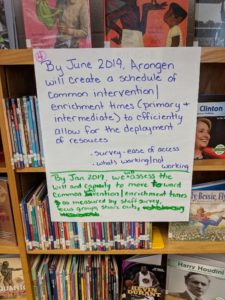Realizing School Improvement Via Teamwork
By Aaron Leo, Postdoctoral Fellow, and Kristen C. Wilcox, Director of Research and Development
Team-based approaches to improve school functioning and student outcomes offer great promise, yet frequently yield mixed results. Too often, school-based teams lack the time and direction to effect long-lasting, positive change in their schools.
Common Pitfalls of Teams
While professional learning communities (PLCs) are a common feature in many schools, in many cases, PLCs don’t address school-wide procedural, process, or practice issues and teams of educators need support to address a number of pitfalls of group work including:
- Absence of trust: Members are reluctant to be honest with each other, particularly with mistakes and need for help.
- Fear of conflict: Members may avoid conflict, but they must respectfully debate issues, especially those difficult to air openly.
- Lack of commitment: With no real discussion and conflict it is difficult for members to commit to decisions. This will result in little direction or commitment.
- Avoidance of accountability: Teams without clear action plans causes loyal members to hesitate to encourage peers to engage in change.
- Inattention to results: If members are not accountable or put their needs ahead of the team, the organization will suffer.
Elementary School Uses NYKids Resources to Improve Interventions Via Teams
To address these important issues, NYKids, in partnership with the Capital Area School Development Association (CASDA) has worked with school teams using COMPASS-AIM (a process and set of tools based on improvement science) to target priority areas and engage in continuous improvement.
One participating school in the 2018-19 school year is Arongen Elementary in the Shenendehowa School District. Their story demonstrates the power of improvement-science processes in combination with NYKids’ research to galvanize teams to achieve shared aims.
In summer 2018, the principal (Andy Hills) along with a team of staff started their improvement journey with NYKids.
Step 1: Build Trust, Commitment and Focus
After taking a NYKids survey of promising practices identified in NYKids research, the Arongen COMPASS team identified intervention services as an area of focus.
“Working with COMPASS & NYKids has allowed our group to focus on the needs of the school with research-based resources.” – Arongen teacher

Step 2: Facilitate Robust Dialogue to Arrive at Shared Aims
Next, NYKids staff, CASDA facilitators, and Arongen COMPASS team members delved into NYKids case studies to help the Arongen COMPASS team collaboratively identify shared goals. In exploring ways to improve intervention services, team members identified scheduling as a key lever to improvement and agreed upon the common goal to create a schedule of common intervention and enrichment times. By following the COMPASS protocols, team members crafted this goal in a way which was both time-bound and included a method to gather data based on staff input to measure the effectiveness of the changes they proposed.
Step 3: Encourage and Support Learning Forward
As the year proceeded members reassessed their goal by considering the need for input from the entire staff. This revision was based on staff surveys, focus groups, and informal share outs. Through this iterative and collaborative process, team members demonstrated accountability for achieving a shared goal of high import to the team and the broader school community.
“The team from UAlbany is so ready to support and help. Our building feels comfort and support from the higher- level institution and I appreciate the connectedness!” – teacher
Learn more about COMPASS here and see this link to register for summer 2019 institutes.
